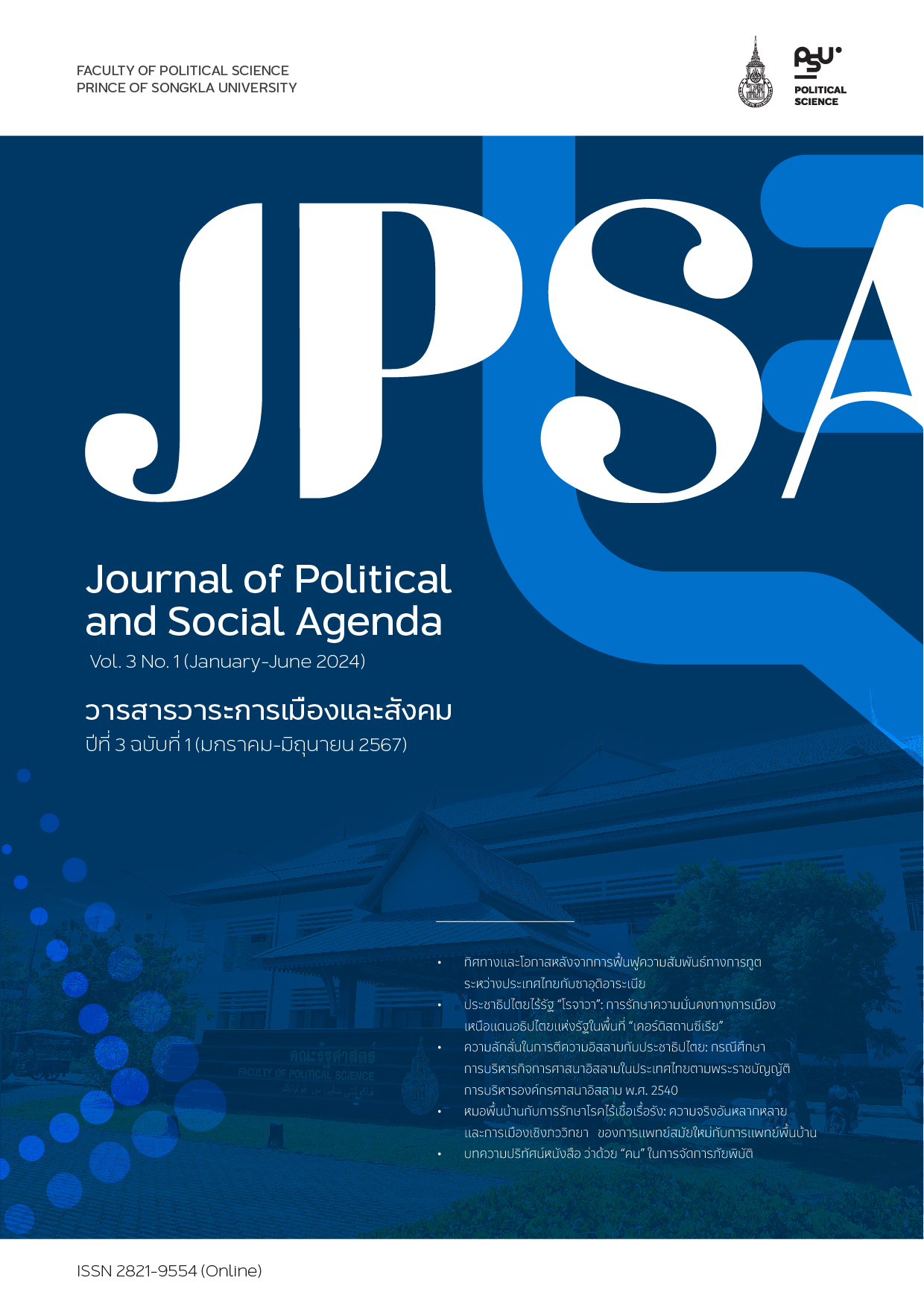ประชาธิปไตยไร้รัฐ “โรจาวา” : การรักษาความมั่นคงทางการเมือง เหนือดินแดนอธิปไตยแห่งรัฐในพื้นที่ “เคอร์ดิสถานซีเรีย”
Main Article Content
บทคัดย่อ
บทความเรื่องนี้ มุ่งศึกษาพัฒนาการทางการเมืองของชาวเคิร์ดในพื้นที่ “เคอร์ดิสถานซีเรีย” ซึ่งเป็นส่วนหนึ่งในดินแดน “เคอร์ดิสถาน” ตามที่ปรากฏใน “สนธิสัญญาแซฟวร์” โดยระบุถึงการให้สิทธิ์ชาวเคิร์ดจัดตั้ง “รัฐชาติ” ขึ้นมาใหม่ แต่ทว่าพื้นที่ตามสนธิสัญญาฉบับนี้ก็ไม่ได้ถูกรับรองด้วยการให้สัตยาบันจาก “รัฐเอกราช” ภายนอกแต่อย่างใด จึงไม่สามารถจัดตั้งเป็นรัฐอธิปไตยโดยสมบูรณ์ได้ ต่อมาบรรดาชาติมหาอำนาจได้ร่วมกันลงนามอีกครั้งใน “สนธิสัญญาโลซาน” นำไปสู่การจัดตั้ง “สาธารณรัฐตุรกี” ขึ้นมาทดแทน ทำให้ “องค์การสันนิบาตชาติ” จำเป็นต้องมีการขีดเส้นเขตแดน “เคอร์ดิสถาน” ตามสนธิสัญญาก่อนหน้านี้ แบ่งออกเป็น 4 ส่วน ด้วยการสร้าง “ข้อตกลงไซคส์-ปิคอต” ก่อให้เกิดการกระจายตัวของดินแดนดังกล่าวไปยังพื้นที่ภายในรัฐอธิปไตยโดยรอบทั้งในประเทศตุรกี ซีเรีย อิรัก และอิหร่านจนถึงปัจจุบัน อย่างไรก็ตาม ชาวเคิร์ดก็ได้ร่วมกันจัดตั้ง “พรรคแรงงานชาวเคิร์ด” (PKK) และ “พรรคสหภาพประชาธิปไตย” (PYD) เรียงตามลำดับ เพื่อจุดประสงค์ในการรักษาฐานที่มั่นทางการเมืองระหว่างประเทศทั้งในตุรกีและซีเรีย จนกระทั่งเกิดเหตุการณ์ “อาหรับสปริง” ที่นำไปสู่สงครามกลางเมืองในหลายพื้นที่ ส่งผลต่อการขยายตัวของสมรภูมิยุทธศาสตร์ทางการรบและยังทำให้ภูมิรัฐศาสตร์หลายแห่งในภูมิภาคตะวันออกกลางเปลี่ยนแปลงไปจากเดิมค่อนข้างมาก ทั้งนี้ สงครามกลางเมืองซีเรียเป็นสมรภูมิรบที่มีความน่าสนใจ เนื่องด้วยชาวเคิร์ดในพื้นที่ทางภาคเหนือและตะวันออกสามารถต่อต้านศัตรูจากหลากหลายฝ่ายจนได้รับชัยชนะอย่างเด็ดขาดและสามารถเข้าครอบครองพื้นที่พิพาทดังกล่าวได้อย่างสมบูรณ์ พร้อมทั้งมีการสถาปนาเขตปกครองตนเอง “โรจาวา” ขึ้นมาภายในรัฐอธิปไตยเหนือดินแดนซีเรีย โดยมีการใช้แนวทาง “ประชาธิปไตย” เป็นหมุดหมายสำคัญในทางการบริหารภายใต้การปกครองรูปแบบ “สหพันธ์ประชาธิปไตย” ที่มีรากฐานอำนาจอธิปไตยในลักษณะพีระมิดหัวกลับ กล่าวคือ ประชาชนสามารถใช้อำนาจอธิปไตยผ่านคณะกรรมการฝ่ายต่าง ๆ ในท้องถิ่นได้อย่างเป็นอิสระ โดยที่ไม่มีอำนาจจากรัฐบาลกลางเข้ามาครอบงำหรือควบคุมกำกับดูแล ทำให้มีความแตกต่างจากลักษณะการปกครองภายใต้กรอบแนวคิด “รัฐชาติ” ที่มุ่งเน้นการสร้างรากฐานอำนาจอธิปไตยในรูปแบบ “รัฐราชการ” ตามหลักการสากลที่นานาชาติยึดถือปฏิบัติกันมา และมีลักษณะเป็นการกำหนดกรอบการใช้อำนาจอธิปไตยผ่านรัฐบาลกลาง ซึ่งทำหน้าที่เป็นตัวแทนของประชาชนในองค์กรระดับชาติ ฉะนั้นแล้ว กระบวนการประชาธิปไตยไร้รัฐของ “โรจาวา” จึงเป็นลักษณะการปกครองขององค์กรระดับท้องถิ่นที่เป็นเอกเทศและมีความเข้มข้นทางด้านการบริหารกิจการสาธารณะระดับจุลภาคภายในชุมชนที่สูงมากกว่าลักษณะการบริหารการปกครองท้องถิ่นในรูปแบบ “รัฐชาติ” โดยทั่วไป
Article Details

อนุญาตภายใต้เงื่อนไข Creative Commons Attribution-NonCommercial-NoDerivatives 4.0 International License.
บทความที่ได้รับการตีพิมพ์ในวารสารออนไลน์เล่มนี้เป็นลิขสิทธิ์ของวารสารวาระการเมืองและสังคม ความคิดเห็นและข้อถกเถียงที่ปรากฏในบทความเป็นความรับผิดชอบของผู้เขียน บรรณาธิการวารสารฯ ไม่มีความเกี่ยวข้องใด ๆ กับความคิดเห็นของผู้เขียนและไม่จำเป็นต้องเห็นด้วยกับความคิดเห็นของผู้เขียน
เอกสารอ้างอิง
ภาษาไทย
ยุทธศาสตร์ หน่อแก้ว. (2565). รูปแบบการปกครองของกลุ่มแบ่งแยกดินแดนในตะวันออกกลาง: กรณีศึกษาเขตปกครองตนเองโรจาวา. วารสารราชภัฏสุราษฎร์ธานี, 9(2), 38-66.
ยุทธศาสตร์ หน่อแก้ว. (2566). ปรัชญาบูรณภาพวิถีอุดมการณ์ปลดเปลื้องรัฐเชิงเอกภาพของพลเมืองสังคมอนาธิปไตยไร้รัฐในเขตปกครองตนเอง “โรจาวา”. วารสารรัฐศาสตร์และรัฐประศาสนศาสตร์, 14(2), 183-222.
ยุทธศาสตร์ หน่อแก้ว. (2566). โรจาวา: สัญญะความเป็นรัฐเชิงนามธรรมว่าด้วยการปกครองของชาวเคิร์ดกับการพัฒนาประชาธิปไตยในภูมิภาคตะวันออกกลาง. วารสารนิติศาสตร์ รัฐศาสตร์ และสังคมศาสตร์ มหาวิทยาลัยราชภัฏเชียงราย, 7(2), 47-70.
ภาษาอังกฤษ
Akkaya, H., & Jongerden, J. (2012). Reassembling the Political: The PKK and the Project of Radical Democracy. European Journal of Turkish Studies Social Sciences on Contemporary Turkey, 14, 1-19.
Allsopp, H., & Van Wilgenburg, W. (2019). The Kurds of Northern Syria. Volume 2: Governance, Diversity and Conflicts. London; New York City; etc.: I.B. Tauris.
Badiou, A. (2002). Ethics: An Essay on the Understanding of Evil. London: Verso.
Bookchin, M. (1985). Ecology and Revolutionary Thought*. Copyright 1965 by Murray Bookchin, Reprinted with permission from Post-Scarcity Anarchism, 1971. Ramparts Press, Palo Alto, California 94303. “Introduction” written December, 1978. Antipode, 17(2-3), 89-98.
Boyraz, C. (2020). Alternative Political Projects of Territoriality and Governance during the Syrian War: The Caliphate Vs Democratic Confederalism. Geopolitics, 26(4), 1095-1120.
Brauns, N., & Kiechle, B. (2010). PKK: Perspektiven des kurdischen Freiheitkampfe: Zwischen Selbsbestimmung, EU und Islam. Stuttgart: Schmetterling Stuttgart.
Çağlayan, H. (2012). From Kawa the Blacksmith to Ishtar the Goddess: Gender Constructions in Ideological-Political Discourses of the Kurdish Movement in Post-1980 Turkey. European Journal of Turkish Studies, 14, 1-28.
Casier, M., & Jongerden, J. (2010). Nationalisms and Politics in Turkey Political Islam, Kemalism and the Kurdish Issue. London & New York: Routledge.
Cemgil, C. (2021). The geopolitics of democratic confederalism in Syria: Geopolitics as the interplay of multiple strategies of spatialisation. Geopolitics, 24(4), 1046-1074.
Chamoun, C. S. (2022). Westernization in Rojava; Infatuation with the West. Master’s Thesis in Global Studies, School of Global Studies, University of Gothenburg.
Dag, V. (2023). The Implications of Turkish Interventions in Rojava for US and EU Foreign Policies. The Commentaries, 3(1), 51–69.
De Jong, A. (2016). A Commune in Rojava? Öcalan, PKK ideology & PYD Policies. Czech: The Anarchist Library.
Dinc, P. (2020). The Kurdish Movement and the Democratic Federation of Northern Syria: An Alternative to the (Nation-)State Model?. Journal of Balkan and Near Eastern Studies, 22(1), 47-67.
Galvan-Alvarez, E. (2020). Rojava: a state subverted or reinvented?. Postcolonial Studies, 23(2), 182-196.
Hammy, C. (2021). Social Ecology in Öcalan’s Thinking. In Hunt S. E. (Ed.). Ecological Solidarity and the Kurdish Freedom Movement (pp. 25-40). London: Lexington Books.
Hammy, C., & Miley, T. J. (2022). Lessons From Rojava for the Paradigm of Social Ecology. Frontiers in Political Science, 3, 1-13.
Helmreich, P. C. (1974). From Paris to Sèvres: The Partition of the Ottoman Empire at the Peace Conference of 1919–1920. Columbus: The Ohio State University Press.
Hoffmann, C., & Matin, K. (2021). Beyond Anarchy and Capital? The Geopolitics of the Rojava Revolution in Syria. Geopolitics, 26(4), 967-972.
Hosseini, A. (2016). The Spirit of the Spiritless Situation: The Significance of Rojava as an Alternative Model of Political Development in the Context of the Middle East. Journal of Socialist Theory, 44(3), 253-265.
Human Rights Watch. (1996). Syria: The Silenced Kurds. Human Rights Watch World Report, 8(4(E)), 1-49.
Jubault, L. (2018). Radical Democracy, Citizenship and Development: Radicalizing Participation to Achieve Transformative Change-The Cases of Chiapas and Rojava. London: SOAS University of London.
Knapp, M., Flach, A., Ayboga, E., & Biehl, J. (2016). Revolution in Rojava: Democratic autonomy and women’s liberation in Syrian Kurdistan. Pluto Press.
Knapp, M., & Jongerden, J. (2016). Communal Democracy: The Social Contract and Confederalism in Rojava. Comparative Islamic Studies, 10(1), 87-109.
Küçük, B., & Özselçuk, C. (2016). The Rojava Experience: Possibilities and Challenges of Building a Democratic Life. South Atlantic Quarterly, 115(1), 184-196.
Leezenberg, M. (2016). The Ambiguities of Democratic Autonomy: The Kurdish movement in Turkey and Rojava. Southeast European and Black Sea Studies, 16(4), 671-690.
Lister, C. R. (2015). The Syrian Jihad: Al-Qaeda, the Islamic State and the Evolution of an Insurgency. Oxford: Oxford University Press.
Organ, H. (2017). From the October Revolution to Revolutionary Rojava: An Ecosocialist Reading. Capitalism Nature Socialism, 28(4), 3-20.
Potiker, S. L. (2019). Obstacles to Insurrection: Militarised Border Crossings Hindering the Rojava Liberation struggle. Anarchist Studies, 27(2), 77-102.
Quataert, D. (2000). The Ottoman Empire, 1700-1922. Cambridge: Cambridge University Press.
Radpey, L. (2021). Self-Determination and Use of Force in Rojava. Journal of Human Rights and Social Work, 6, 327–336.
Rogan, E. (2015). The Fall of the Ottomans: The Great War in the Middle East. New York: Basic Books.
Savran, Y. (2016). The Rojava Revolution and British Solidarity. Anarchist Studies, 24(1), 7-12.
Shahvisi, A. (2021). Beyond Orientalism: Exploring the Distinctive Feminism of Democratic Confederalism in Rojava. Geopolitics, 26(4), 998-1022.
Üstündağ, N. (2016). Self-Defense as a Revolutionary Practice in Rojava, or How to Unmake the State. South Atlantic Quarterly, 115(1), 197-210.
Van Bruinessen, M. (1988). Between Guerrilla War and Political Murder: The Workers’ Party of Kurdistan. Middle East Report, 153, 40-42+44-46+50.
Weiner, T. (1999). U.S. Helped Turkey Find and Capture Kurd Rebel. New York: The New York Times.
Yarkin, G. (2015). The Ideological Transformation of the PKK regarding the Political Economy of the Kurdish Region in Turkey. Kurdish Studies, 3(1), 26-46.
Zisser, E. (2014). The Kurds in Syria: Caught between the Struggle for Civil Equality and the Search for National identity. In Bengio, O. (ed). Kurdish Awakening. Nation Building in a Fragmented Homeland. Austin: University of Texas Press.


